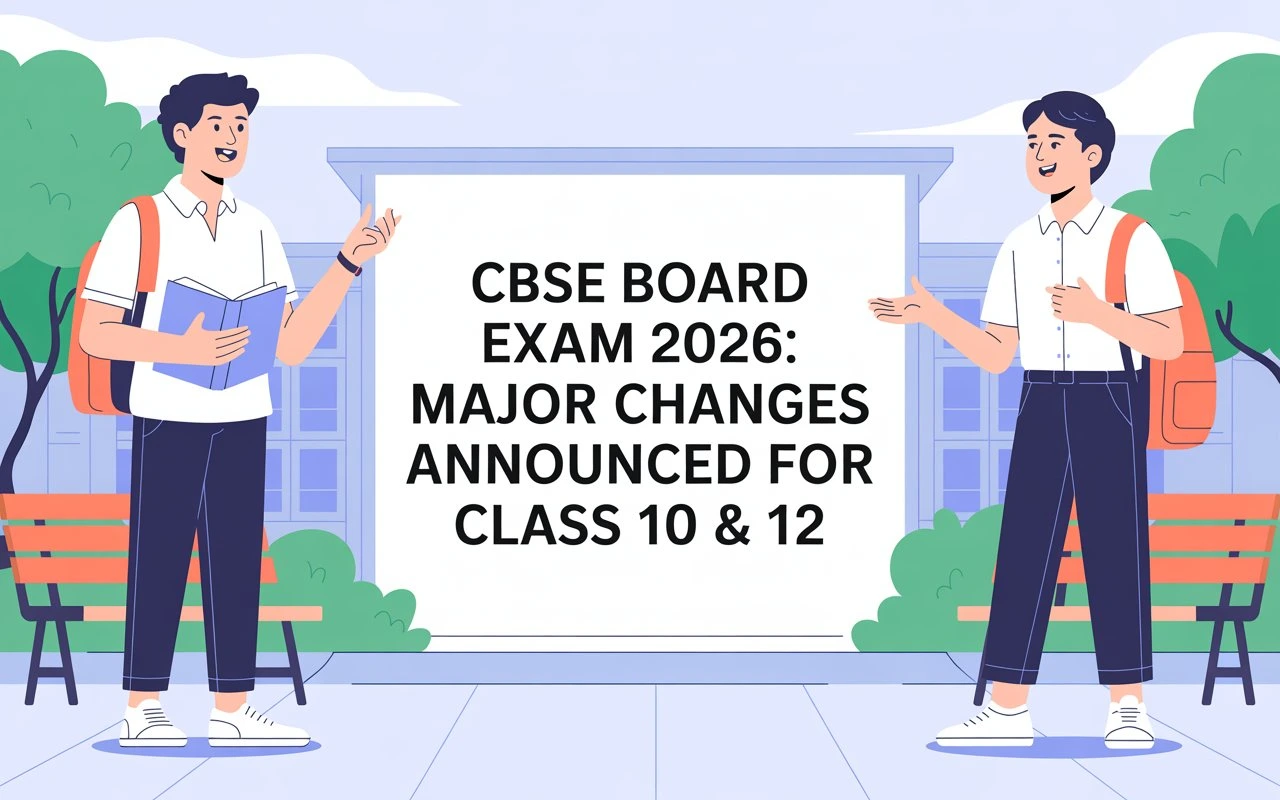Board Exam 2026 Major Changes Announced! New CBSE Exam Pattern for Class 10 & 12




Big changes are coming to CBSE Board Exams in 2026! The Central Board of Secondary Education (CBSE) has officially announced a new exam pattern for Classes 10 and 12, aligned with the National Education Policy (NEP) 2020.
These changes are designed to reduce exam stress, move away from rote memorization, and encourage real understanding and application of knowledge. For the first time ever, CBSE will introduce two board exam opportunities in a single academic year, along with a fresh structure for competency-based questions, updated syllabus, and a new evaluation system.
If you’re appearing for the CBSE Board Exam 2026, here’s everything you need to know.

CBSE board is moving towards competency-based learning, where students will be tested on how well they understand and apply concepts — not just memorize them. Both Class 10 and Class 12 question papers will have a new structure starting from the 2026 exams.
The new CBSE question paper design for Class 10 (2026) will be:
The theory exam will carry 80 marks, while the remaining 20 marks will be reserved for internal assessments.
Know more about CBSE class 10 pattern changes,
The Class 12 exam pattern will also see a major shift toward application-based assessment.
These changes aim to make the CBSE Class 12 competency-based questions a key part of student evaluation.
A major reform in the CBSE curriculum 2026 is the introduction of two board exams per year — a Main Exam and an Improvement Exam.
Students can use the second exam to improve their scores within the same academic year.
The best score between the two attempts will be considered final. This flexible system reduces stress and pressure while giving every student a fair chance to do better without repeating the year.
To learn more about CBSE’s two-exam system, check out our detailed article below for complete information.
CBSE has also introduced a new evaluation system to make assessments more transparent, digital, and consistent.
To appear for the 2026 board exams, students must have at least 75% attendance. Attendance will now be directly linked to internal assessments, making regular participation in school activities more important than ever.
Internal assessments will now carry greater weightage.
Students will be evaluated on:
This ensures continuous learning instead of depending only on one final exam.
A new nine-point grading scale will replace the older grading model.
This system aims to reduce unhealthy competition while keeping the evaluation fair.
The CBSE curriculum 2026 will include new subjects, skill modules, and vocational options for Class 12 students to encourage real-world learning.
Some of the newly introduced electives are:
These subjects promote practical knowledge and career readiness, especially for students planning to pursue professional or skill-based courses after school.
Class 12 will now include seven learning areas:
This structure gives equal importance to both academic and skill-based education.
The shift to competency-based questions means your preparation strategy should focus more on understanding concepts and applying them, rather than just memorizing.
Here are some study tips to help you adjust to the new exam pattern:
With such big changes in the CBSE exam structure, students need focused guidance to adapt to the new question pattern and competency-based learning. That’s where Interval Learning can make a real difference.
Learning gets easier when it’s personal.
At Interval Learning, every student gets a dedicated tutor for live, one-on-one online classes. These sessions are tailored to your syllabus, pace, and goals — whether it’s clearing doubts, mastering tough topics, or improving exam scores.
Each class usually lasts 1.5 hours (or 2 hours for senior classes) and follows a flexible schedule coordinated by our Client Relation Officer (CRO). Parents and students can easily request schedule changes whenever needed.
All you need to do is log in on time and stay consistent. Our expert tutors focus only on you — helping you understand better, learn faster, and perform with confidence.
Get personalized guidance, flexible scheduling, and focused learning — all from the comfort of your home with Interval Learning’s One-on-One Online Tuition.
Short on time but aiming for high scores?
Interval Learning’s Crash Course for CBSE Class 10 & 12 is a fast-track program that helps you revise smarter and perform better. It’s perfect for students who want to quickly cover key chapters, practice board-level questions, and strengthen exam strategy before the big day.
Here’s what you’ll get:
Get exam-ready faster with Interval Learning’s CBSE Crash Course, your shortcut to smarter, sharper preparation.
Start your journey today and get exam-ready with expert guidance. Contact us today!
CBSE will implement a new exam pattern, introduce two exam opportunities (Main and Improvement), include more competency-based questions, and enforce a 75% attendance rule.
Yes. Both Classes 10 and 12 will have two exams — one in February and one in May. The best score from the two will count.
It includes 40% competency-based questions, 20% objective questions, and 40% short and long answer questions.
Evaluation will include internal assessments, digital checking, and a nine-point grading system.
Students must have at least 75% attendance to be eligible for the CBSE board exams. This attendance will also affect internal assessment marks.
Yes. New CBSE subjects like Design Thinking, Physical Activity Trainer, and Electronics & Hardware have been introduced.
Interval Learning provides personalized one-on-one tuition and crash courses for Classes 10 and 12, helping students understand the new pattern and master competency-based questions.
Yes. All lessons, tests, and mock papers are aligned with the latest CBSE guidelines, syllabus updates, and internal assessment rules.
Absolutely. Our flexible online sessions are designed to complement school learning and focus on quick, effective exam preparation.
You can easily register through the Interval Learning website and choose your preferred schedule for one-on-one or crash course sessions.